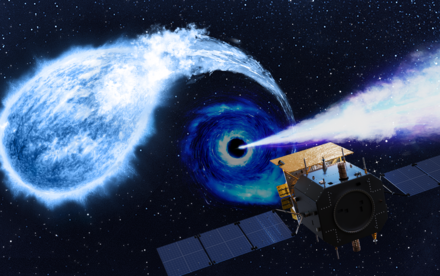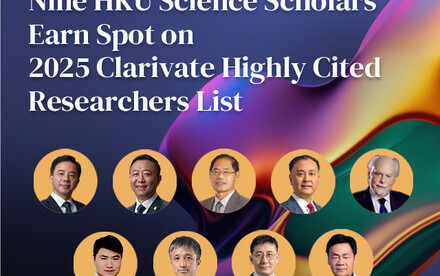06 Nov 2025
HKU Launches the Hong Kong Institute for Astronomy and Astrophysics, Positioning Hong Kong as a Global Hub for Cosmic Discovery

On November 3, 2025, The University of Hong Kong marked a historic milestone with the official inauguration of the Hong Kong Institute for Astronomy and Astrophysics (HKIAA). The ceremony brought together a constellation of the world's leading scientists and government leaders to celebrate the establishment of a new beacon for astronomical research in the region.
In the inauguration address, HKU President and Vice-Chancellor Professor Xiang Zhang welcomed and thanked all the distinguished guests and scholars for joining this milestone event in HKU and Hong Kong. He remarked that astronomy and astrophysics are at the frontier of science and have an impact on other disciplines, and are also areas where international collaborations are essential and possible. He emphasised that the Institute will unite astronomers across Hong Kong and the Greater Bay Area, reinforcing the city's role as a vibrant crossroads for global science.
The HKSAR Government’s strong support was affirmed by Professor Dong Sun, JP, Secretary for Innovation, Technology and Industry. "Hong Kong has always been a place where curiosity meets opportunity," Secretary Sun said. He positioned the HKIAA as a vital platform that will "strengthen Hong Kong’s role as a global hub for scientific excellence, attracting top talent and fostering partnerships with leading international institutions."



Professor Bing Zhang, the Founding Director of HKIAA and Chair Professor of Astrophysics, shared his vision of launching the HKIAA. He highlighted Hong Kong's unique potential to advance astronomy and astrophysics in East Asia. "Hong Kong should become known not only for awarding top astrophysicists but also for pioneering cutting-edge research," Professor Zhang stated. In view of China’s rapid growth in science and technology, Professor Zhang also emphasised that HKIAA will become a key player in China’s fast-growing astronomical enterprise.
The ceremony was witnessed by more than 20 representatives from astronomical institutions from mainland China, including four academicians from the Chinese Academy of Sciences. Professors Yipeng Jing from Shanghai Jiaotong University and Professor Shengcai Shi from the Purple Mountain Observatory offered warm congratulatory addresses at the ceremony. They foresee strong ties and collaboration opportunities between the HKIAA and their institutions, as well as other astronomical institutions in mainland China.
The Institute also received a powerful endorsement from the international community through a heartfelt address by Professor Matthew Bailes, 2023 Shaw Laureate in Astronomy. Reflecting on his journey as an accomplished scientist and a leader of an institute, he highlighted the unifying power of science. "Scientists really lead the way on diplomacy," Professor Bailes stated. “The Institute can be a great avenue for scientists from both the East and the West to work together."
The inauguration event concluded with video messages from other global leaders in the field, which was followed by the whole day program of the First HKIAA Symposium that featured HKIAA members from four universities to present their cutting-edge research in broader areas of astrophysics.
The HKIAA currently brings together nine Faculty members from HKU's Department of Physics and Earth & Planetary Sciences, and has 14 affiliated members from institutions across Hong Kong. With plans for significant recruitment and a new, spacious facility at Cyberport set to open in early 2026, the Institute aims to be an international centre of research excellence, a platform for global collaboration, and a central hub for astronomers across Hong Kong and the Greater Bay Area.







